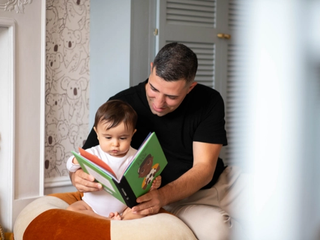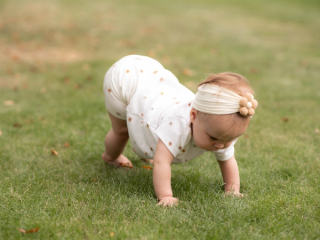
- Home
- Advice Hub
- Baby
- Bonding & Development
- How To Help Your Baby Sleep When Teething?
How to help your baby sleep when teething?
Teething – a milestone that heralds the arrival of those adorable little teeth – can also bring about sleepless nights for both baby and parents alike. Here are some tips to help soothe your teething baby back to sleep and maintain a semblance of a sleep routine.
Teething – a milestone that heralds the arrival of those adorable little teeth – can also bring about sleepless nights for both baby and parents alike. But fear not, navigating this phase with ease is entirely possible. Here are some tips to help soothe your teething baby back to sleep and maintain a semblance of a sleep routine.
Understanding teething
First and foremost, it’s essential to recognise that teething is a normal developmental stage for your little one. It typically begins around six months of age and can last until they are about two and a half or three years old. However, it's not a continuous process; it comes and goes as each tooth decides to make its grand entrance.
Recognising the symptoms
Teething manifests differently in every baby, but common signs include red and sore gums, flushed cheeks, excessive drooling, and irritability. Some babies may also exhibit changes in appetite, preferring to nurse more frequently or eat less solid food. It's important to remember that some babies are more affected by teething than others, so your little one's experience may vary.
Teething and sleep
When your baby is teething it can disrupt sleep, but typically, the disturbance lasts for only about three to seven days as the tooth cuts through. If your baby's sleep disturbances persist for weeks or months, teething might not be the sole culprit.
Why does teething seem to wreak havoc at night?
Well, there are a few reasons!
During the daytime babies tend to manage to distract themselves and can engage in activities which soothe and alleviate the discomfort; feeding, eating and chewing on toys, hands and fingers! This all helps relieve the pressure in the gums. However, when they have been asleep several hours, this pressure builds. Lying flat can also exacerbate teething pain due to increased pressure in the head. Plus, levels of the anti-inflammatory hormone cortisol tend to be lower at night, making discomfort more pronounced.
Soothing strategies
So what can you do to help soothe teething discomfort?
- Allow some contact naps – if your baby is really struggling to nap weigh up the pros and cons of allowing the odd contact nap to ensure they get the rest they need.
- Bring bedtime earlier – If naps have been more difficult to achieve due to teething it is worthwhile bringing bedtime 20-30 minutes earlier to compensate for the loss of sleep, not forgetting that your baby may well just feel more tired when they are struggling with teething pain.
- Test out different teething remedies – some babies prefer cool teething toys or chilled flannels to chew on whist others may like some warmth. Offer your baby both to see what works best for them.
- Gum massage - Gently rub your baby's gums with a clean finger to alleviate pain.
- Extra comfort and reassurance - Your baby may well appear more ‘clingy’ and this is normal. Offer them extra love and cuddles during this time.
Helping soothe at night
Helping your teething baby at night requires a little prior planning and preparation:
- Pre-feeding massage: Before bedtime feeding, gently massage your baby's swollen gums with a clean, cool finger to alleviate discomfort and ensure a fuller feeding session.
- Prep the soothers: Keep a stash of chilled or warm flannels and teething toys nearby to provide quick relief during night-time waking. Sometimes this is enough to relieve the pressure and discomfort long enough for baby to be able to sleep again. Consider offering pain relievers if your baby is in obvious discomfort, but always consult with your healthcare provider first.
- Use a stepped approach: While it's tempting to offer all the extra comfort during teething episodes, try to maintain your regular bedtime routine as much as possible. Consistency is key in helping your baby establish healthy sleep habits. If your baby is struggling to fall asleep in their usual way, try to use a stepped approach, layering on additional comfort as needed. For example if your baby usually falls asleep happily in their cot alone, you may not need to go as far as picking up and rocking to sleep. See what interim steps you can try first to comfort the, for example a reassuring shush, hand on chest or a stroke of the head whilst they are still in their sleep space. You can move into picking up and cuddling if you need to!
While teething can certainly pose challenges to your baby's sleep routine, armed with these tips, a little preparation and a touch of patience, you can help your little one navigate this milestone with ease.
Advice & tips

Want to read more? Join the HiPP BabyClub for full access to this article.
As a BabyClub member, you'll get access to a range of exclusive benefits, including:
Monthly competitions
Discounts from our Partners
Expert advice tailored to your little one's age
Weaning recipes
HiPP shop discounts*
*10% off HiPP's online shop does not apply to our First Infant, Anti-Reflux or Comfort Formula Milk.
Important notice: Breastfeeding is best. Follow on milk should only be used as part of a mixed diet from 6 months. Talk to a healthcare professional.
















